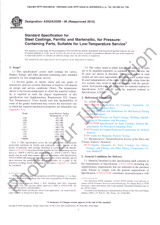Wir benötigen Ihre Einwilligung zur Verwendung der einzelnen Daten, damit Sie unter anderem Informationen zu Ihren Interessen einsehen können. Klicken Sie auf "OK", um Ihre Zustimmung zu erteilen.
ASTM D7143-17
Standard Practice for Emission Cells for the Determination of Volatile Organic Emissions from Indoor Materials/Products
Name übersetzen
NORM herausgegeben am 1.3.2017
Informationen über die Norm:
Bezeichnung normen: ASTM D7143-17
Anmerkung: UNGÜLTIG
Ausgabedatum normen: 1.3.2017
SKU: NS-680075
Zahl der Seiten: 20
Gewicht ca.: 60 g (0.13 Pfund)
Land: Amerikanische technische Norm
Kategorie: Technische Normen ASTM
Kategorie - ähnliche Normen:
Die Annotation des Normtextes ASTM D7143-17 :
Keywords:
emissions cells, indoor air quality, indoor materials, indoor products, materials emissions testing, organic emissions, volatile organic compounds,, ICS Number Code 13.040.20 (Ambient atmospheres)
Ergänzende Informationen
| Significance and Use | ||||||||||||||||||
|
5.1 Indoor materials/products are products or materials used for construction works or in the indoor environment. The area specific emission rates of volatile organic compounds from an indoor material/product may be used to estimate the expected contribution of emissions from that material/product to the atmosphere of a given indoor environment. 5.2 Emission data may also be used to compare and categorize different indoor materials/products of similar function. 5.3 Emission cell testing of area specific emissions may alternatively be used for studying secondary interactions (for example, sink effects (absorption and re-emission of volatile organics by the indoor material/product) or emissions generated by chemical degradation of the indoor material/product caused by specific atmospheric agents such as water, ozone or NO1.1 This practice is intended for determining volatile organic compound (VOC) emissions from materials and products using emission cells. It can be applied in principle to most construction materials and many products used indoors. Objectives include: 1.1.1 To provide manufacturers, builders, and end users with emission data useful for evaluating the impact of building products, new or old, on indoor air concentrations in a model room. 1.1.2 To promote the development of products with lower VOC emissions. 1.2 This practice is for identifying emitted VOCs and for determining the area specific emission rate of VOCs from newly produced building products under defined climate conditions. The method can also be applied to aged products. 1.3 In accordance with the definition of an emission cell, it is also possible to perform nondestructive emission measurements on building products on-site in buildings. However, the procedure for such measurements is not described in this practice. 1.4 This practice describes the design, construction, performance evaluation and use of emission cells for VOC emission testing. Sampling, transport and storage of materials to be tested, and preparation of test specimens are also described. 1.5 Air sampling and analytical methods for the determination of VOCs are described in Practice D6196. Alternative sampling and analytical approaches for formaldehyde and other carbonyls are described in Test Method D5197. Note 1: All volatile (vapor-phase) carbonyls except
formaldehyde can be analyzed by either Practice D6196 or by Test Method D5197.
Note 2: Direct-reading instruments can also be applied for
specific objectives.
Note 3: Some volatile inorganic compounds can, in principle,
also be analyzed (for example, ammonia).
1.6 An example of an emission cell is described in Appendix X2 of this practice. 1.7 The values stated in SI units are to be regarded as standard. No other units of measurement are included in this standard. 1.8 This international standard was developed in accordance with internationally recognized principles on standardization established in the Decision on Principles for the Development of International Standards, Guides and Recommendations issued by the World Trade Organization Technical Barriers to Trade (TBT) Committee. |
||||||||||||||||||
| 2. Referenced Documents | ||||||||||||||||||
|
Empfehlungen:
Aktualisierung der technischen Normen
Wollen Sie sich sicher sein, dass Sie nur die gültigen technischen Normen verwenden?
Wir bieten Ihnen eine Lösung, die Ihnen eine Monatsübersicht über die Aktualität der von Ihnen angewandten Normen sicher stellt.
Brauchen Sie mehr Informationen? Sehen Sie sich diese Seite an.




 Cookies
Cookies
